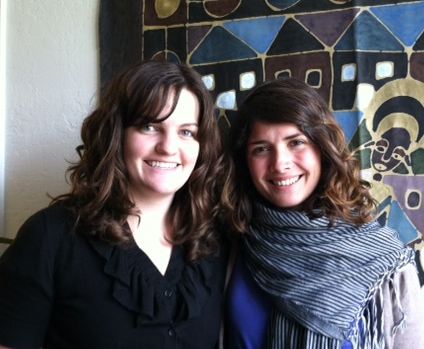A Career in Philanthropy
 What’s it like to start a career in philanthropy? Three Firelight staff, Mia and Sasha (pictured here) and Bridget, are pretty early in their careers and offer their fresh perspective on reviewing grants, working with grantee-partners and philanthropy itself. One way to sum it up, “My job’s not boring!”
About 115 applications were submitted in this cycle; what’s important to consider as you review them?
What’s it like to start a career in philanthropy? Three Firelight staff, Mia and Sasha (pictured here) and Bridget, are pretty early in their careers and offer their fresh perspective on reviewing grants, working with grantee-partners and philanthropy itself. One way to sum it up, “My job’s not boring!”
About 115 applications were submitted in this cycle; what’s important to consider as you review them?
Having respect for the grantee. When we send questions back to the organization, we have to consider what we’re asking them to do and how much work it will take. While we’re collecting information, we’re also developing a relationship and not just a financial relationship. Our work is to provide support and council to organization leaders so that throughout our seven-year partnership, we can help organizations to bring in funds from other funding sources. It’s important that we are really connected to the result of our work of improving children’s lives.
You put a lot of work into building relationships with grantee-partners. Do you see the same relationships happening within philanthropy?
The idea that we are competing against each other isn’t right—we’re all working for the same thing. We’re
working to fill the gaps that society isn’t filling. Philanthropy is the business of thinking about those gaps, learning from it, and seeing a change in it. We just attended the Northern California Grantmakers, New Grantmakers Institute and it did a great job of bringing people together to talk about this.
Each application is anywhere between 8-15 pages long; what are the important skills for assessing proposals and making recommendations?
You have to be detail-oriented because there’s so much to look into and track. It’s also important to be curious and dig deeper. You have to ask why is it that this group is struggling and find out what’s happening on the ground. Communication is important too, you have to be able to convey what you are doing and be empathetic. Because you are working with vulnerable populations, in a cultural context that is not familiar to you, it is important to be open-minded to a reality that is very different from your own.
Philanthropy is often about the long-term change, how do you stay motivated?
In our positions as Program Assistants, we are often dealing with data entry and repetitive tasks. Passion is what gets us through the dry parts of the job. As philanthropists we see change as a long-term process, however, we are challenged in our field to report on significant impact of our grantee-partners' work over the course of one year. Although the grants we give are small, they are making a difference no matter how measurable the outcome. It’s this mindset that keeps us motivated.
How do you prepare for a career in philanthropy?
The best way to learn is to just get in it—volunteer somewhere and see if it’s the right fit. The cool part about philanthropy is that you become skilled in so many different things--you learn from building personal relationships and from collecting and analyzing information. It doesn’t hurt to understand the way money works also; it’s key to philanthropy because that’s what we are working with, an economics class could be helpful in creating a framework to understanding this. And it helps if you've been on the grant-receiving side; it provides a better understanding of the process. No one really knows that philanthropy exists when graduating from college so just studying what you love can lead you here.
Mia, Sasha, and Bridget are Program Assistants at Firelight Foundation.

